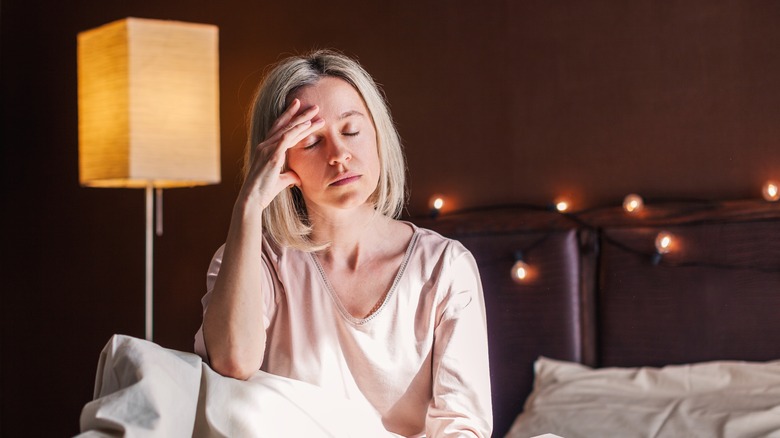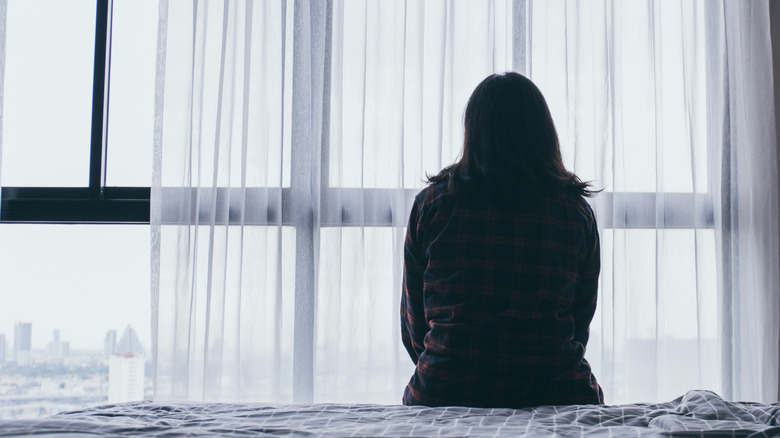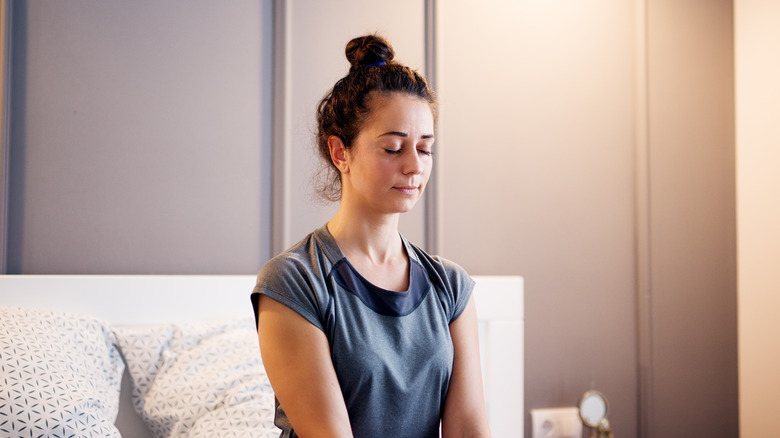Here's Why You Might Be Getting Panic Attacks At Night
If you've ever felt the stomach-dropping terror of a night-time panic attack, you're not the only one. If you can't figure out what's triggering your panic attacks, however, you're not alone in this either.
Don't get these confused with hypnic jerks, the "falling" sensation that can accompany muscle twitches that happen while you're going to sleep, Allyson Hoffman explains for Sleep.org. These jerks can happen during the period between awake and asleep, writes Hoffman, and being startled awake by one can cause the same feelings as a panic attack, like a racing heart rate and hyperventilation.
With such an overlap in physical response, it's easy to see why hypnic jerks can be mistaken for nocturnal panic attacks, but the root causes of the two are vastly different. For one, we understand why hypnic jerks happen – panic attacks aren't so simple.
If you've had panic attacks during the day, you may have experienced them at night, too. The Cleveland Clinic reports 18% of people who experience panic attacks have had them at night, but unlike other panic disorders, nocturnal panic attacks aren't currently a specific diagnosis in the Diagnostic and Statistical Manual of Mental Disorders (DSM), per Shape Magazine. With all that said, it doesn't mean nighttime panic attacks aren't as serious. Research shows that nighttime panic attacks could be a subcategory of panic disorders and may also share the same physical responses as night terrors.
Are nocturnal panic attacks different from normal panic attacks?
Panic attacks are generally experienced the same way, no matter if they happen during the day or at night. Most experience a rapid heart rate, chills, shortness of breath, tremors, and a "sense of impending doom," according to the Mayo Clinic. But unlike daytime attacks, with nighttime attacks you generally won't know what triggered you.
Clinical psychologist Alfiee Breland-Noble, Ph.D., explained to Shape Magazine, "Because there is a physiological component to our flight or fight response, your body adjust[s] to living in hyper-vigilance and high alert mode." When you're constantly in an anxious or stressed state when you're awake, stress hormone production goes into overdrive and doesn't just shut off because you go to sleep, says Breland-Noble. Instead, it spills over into times when we're not actively controlling, or ignoring, our thoughts and feelings and responses to them. Likewise, insomnia and general lack of sleep can also cause panic attacks, psychiatrist Leela Magavi, M.D., tells Shape Magazine.
But don't just stop at stress: the Mayo Clinic suggests seeing your doctor — in addition to talking to a therapist — about your nighttime panic attacks because conditions like a sleep disorder or a thyroid problem can mimic the symptoms of a panic disorder. Sleep apnea, too, can imitate the physical responses to panic attacks; you can startle awake because you can't breathe, which makes your heart race and you can break out in sweat, per Shape Magazine.
How to treat nighttime panic attacks
Unfortunately, there is no short answer as to why you're experiencing nocturnal panic attacks or how to stop them. Therapist Cynthia Catchings explained to TalkSpace that said nighttime panic attacks can be caused by a myriad of reasons, including stress and trauma, but the experience is as unique to each person as their fingerprint is.
While you can do many things to help manage stress and anxiety to aid in the frequency of nocturnal panic attacks, clinical psychologist Scott Bea says the best thing to do is nothing (via Cleveland Clinic). Bea compared panic attacks to quicksand, explaining, "If you end up in quicksand, it's a really good idea to just be still. If you move, it only makes things worse." Therefore, if you get panic attacks at night, trying to normalize the experience could be the best solution.
Fighting a panic attack while it's happening, Bea further noted, forces the body into fight-or-flight mode which can make attacks worse. Instead, he suggested going into another room or finding something relaxing to help your body wind down so you can go back to sleep.
But there are also different practices you can do during your awake time to help mitigate stress and anxiety. TalkSpace suggests adding a hot Epsom salt bath to your bedtime routine on particularly stressful days, or starting yoga or Tai Chi; both are low-impact, peaceful ways to exercise that help with mindfulness and breath control.


